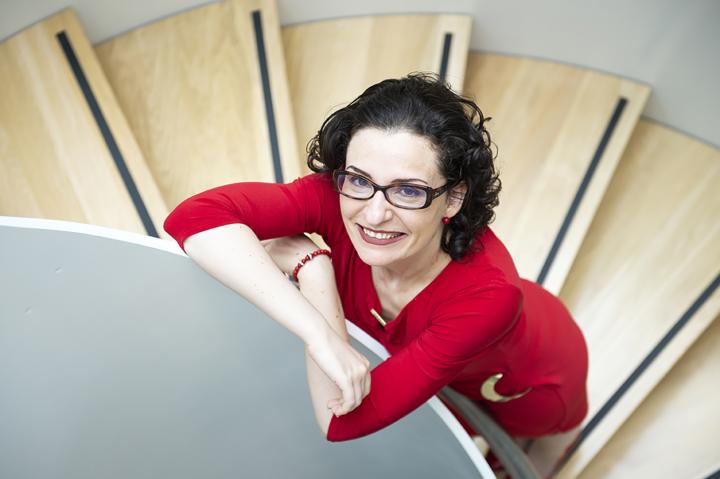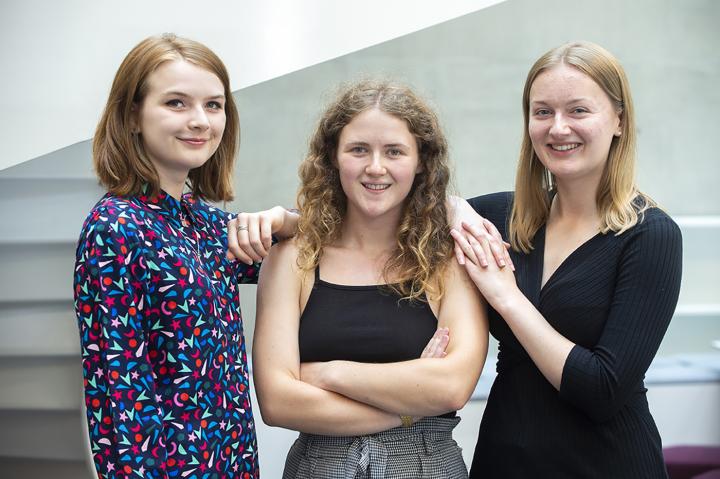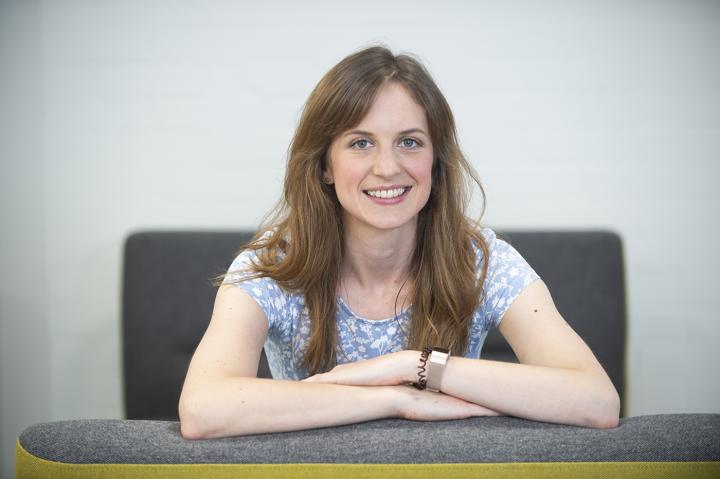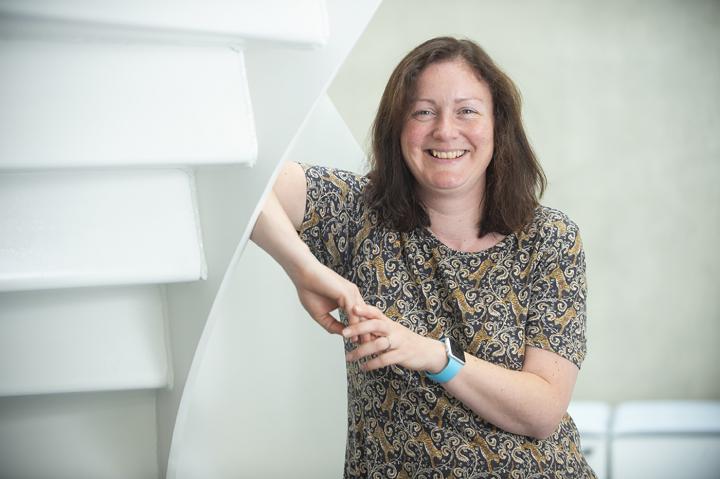Women in data have the answers
In a series of candid interviews, women with tech careers reveal how they are taking on the data revolution.
Only around 13 per cent of science, technical, engineering and medicine jobs are occupied by women, according to Skills Development Scotland.
Data science is an area where women are under-represented. However, a campaign run by the University's Data-Driven Innovation (DDI) programme is shining a light on the skills and experience of women who are passionate about, and excelling in, careers in data.
The DDI programme is a partnership between the Universities of Edinburgh and Heriot-Watt. It is part of the Edinburgh and South East Scotland City Region Deal and aims to help organisations and all people benefit from the data revolution.
More than 60 women were interviewed by Poppy Abbott-Gerrard, a PhD candidate and tutor in Sociology at the University, who is leading on the Women in Data project. Below are extracts from some of her inspiring conversations with staff, students and alumni.

Dr Jasmina Lazic
Chief Data Technologist, Bayes Centre
Tell us about your background and journey to your current role
I had an avid curiosity for puzzles and problem solving as a young child, and this drove me towards mathematics. I completed my bachelor’s degree in mathematics and computer science at the University of Belgrade before undertaking a PhD in mathematics at Brunel University London. My passion for using mathematics to improve the world around us was my driving force to begin a career in technology. In my current role as Chief Data Technologist at the Bayes Centre, I lead, facilitate and enable the commercial adoption of cutting-edge data science and technology developed at the University of Edinburgh, to foster new collaborative partnerships between the University and industry partners. I get to work with clients who use cutting-edge technology solutions, from satellites and robots to self-driving cars. What I find most rewarding about my career is using science and technology to improve our lives and society.
What is your vision for data innovation and the DDI programme?
I see the DDI programme as a fantastic way of democratising data science and innovation, and a great channel for cutting-edge technology adoption for companies and businesses.
And do you have any particularly interesting projects going on right now or are they top-secret?
The Bill and Melinda Gates Foundation is doing some impressive work in sub-Saharan Africa on helping farmers, communities and governments with livestock production. Together with researchers from the Royal Dick School of Veterinary Sciences and SEBI (Supporting Evidence Based Interventions) programme, we are using data-driven approaches to help them understand the effectiveness and impact of their initiatives and methodologies. For example, providing recommendations on vaccines, feeding, artificial insemination, based on in-depth data processing and analytics. We are also looking at incorporating new and innovative data sources into these approaches, such as satellite imagery and/or sensors and the Internet of Things.
What do you think are the biggest challenges for women and girls in your field?
We live in a culture where (over)confidence and sometimes, sadly, arrogance, are often mistaken for competence. I would like to see more appreciation for humility and more effort toward building collaborative, rather than competitive, working environments.
What would you recommend to women and girls who’d like to do what you’re doing?
Build a good supportive career network. Look out for mentors and sponsors. A mentor is someone who can coach you, provide advice, or simply serve as a good role model. A sponsor is someone who can raise your profile and help you with career promotion. They are not necessarily the same person. And they are not necessarily your manager – although, if your manager is also your mentor and/or sponsor, you are in a great position. The more mentors and sponsors you have, the better.

The University of Edinburgh’s Women in STEM Society
Bethan Froggatt-Thomas, studying chemical engineering and management, Rebecca Collins, studying mathematics and statistics and Rhona Keirnan, studying mathematics
What's the purpose of the society?
The University of Edinburgh Women in STEM’s main aims are to support, promote and connect women in STEM (Science, Technology, Engineering and Maths). We do this through a variety of events including academic talks, networking events, socials and this year we even had our very first hackathon. We also help our members find job and internship opportunities through workshops, networking events and sharing job opportunities passed onto us by sponsors. We hope our society can help break down the stereotypes of STEM and make female STEM students feel less isolated in male-dominated degrees.
Who are your members? What work are they involved in?
Most of our members are female students at the University studying a STEM degree but we do have a few members from other degrees and some men have got involved as well. Our members have diverse backgrounds, goals and even degrees – there’s everything from geoscience and biology to artificial intelligence. We try to provide a range of opportunities for our members to accommodate for everyone, whether it’s industry or research you’re interested in. Currently, our committee and members are all over the world doing internships in a vast variety of organisations.
What are the biggest challenges for your members?
There has been some really positive change happening in the recent years within STEM but there are still a lot of stereotypes and assumptions of STEM students which can be quite damaging. Most of our members have a story about something someone has done or said to them because of their gender. This sort of behaviour can be isolating and makes entering the industry after university even more daunting but the support provided by our society can be extremely helpful at making you feel less alone.
Why is it important for women to have representation and power in STEM work?
‘You can’t be what you can’t see’ explains it perfectly. Without representation in your chosen field – no matter what that field is – it is so much harder to start a career, and even harder to stay in the field. If you’re feeling isolated it’s so important to hear from other people like you feeling the same way.
The so called ‘leaky pipeline’ is one of the biggest issues when encouraging diversity in STEM, having role models is so vital so inspire women to stay in STEM. Role models help to break down stereotypes for not only women but everyone which is key. We cannot create an equal workforce without support of men and by breaking down stereotypes we start to reduce unconscious bias and conscious bias too for that matter.
What are the ambitions of your members, generally?
Most of our members go on to have a career in industry but we also have many women who go into research or do postgraduate degrees. It’s really important to us that our members pursue a career in STEM as Equate Scotland figures show 73 per cent of women who study a STEM subject do not have a career in STEM afterwards.

Katie Barker-Ward
Senior Transformation Consultant, Waterstons: Business and IT Consultancy
Can you tell us about your journey into your current role and what inspired you to go into it?
I have worked in IT for six years, which is really all about data. I studied history at Edinburgh with a view to go on to a law conversion course but when I finished, it was still the middle of the recession. I looked at working in finance. History is all about pulling loads of information together from different sources and making sense of it and then articulating it to your audience – and I think working in finance relates to that skill set. I handed my CV in to a local company but they came back and said my skill set suited to an IT role, which was a curveball for me. The thing that drew me in was that in the role I would work across the whole business, all the different parts of the organisation. My manager was drawn to my research – when I was studying in the USA, I had done a thesis analysing a lot of census data.
When you worked in that first IT role, how supportive did you find it of women?
I was the only girl in that team. It was all men on the team but they were really lovely; they made me very welcome and I learnt loads from them. I was really young and didn’t take all the opportunities that I could have to network with other women and feel more at home. The Managing Director was a woman, the daughter of the founder, and she was very interested in data and pushed the company to gather data to understand it so we could be more efficient and see how well we are doing. I did not feel supported specifically as a woman but I did as a person and a team member.
Can you tell us what a typical day of work looks like for you in your current role as Senior Transformation Consultant?
I’ve been working on a business intelligence strategy, which involves interviewing key stakeholders to find out what their needs are and to understand what the status quo is. Another project we’re involved in is building a data warehouse for a customer so that they have the right information from which to make decisions. That uses different products to get their data, transform it and output it into Power BI so that they can report on what they need.
What part of your role do you find the most exciting?
I just love IT and how it helps give people a better handle on what they’re doing, a better picture. What we do is so broad – from helping people collaborate better to ensuring their data and systems are secure and robust. I personally like talking to lots of different people and learning about their business. I moved into the data team because I do find it so interesting, you can learn so much about your performance from a business perspective – you might think you’re doing really well in one area and then the data can tell you a different story. I also like organisation (laughs) so I like working on data warehouses and getting everything in order!
Is your role something that you would recommend for women and girls to go into?
I love my role, there is a blend of soft and technical skills – talking to people and understanding data. IT can be really flexible so this is great for all genders and good for those who have children or other family commitments. It is important nowadays that things move away from the nine to five. We don’t live nine to five lives, or staying in the office for nine hours for the sake of it – it doesn’t mean nine hours of output. The client comes first so it means I travel as well. Sometimes we work shorter hours, sometimes longer hours. The culture means we work when is best for you, as long as the needs of the customer and colleagues are met.

Judy Robertson
Chair in Digital Learning at the University and supervisor of the Women in Data project at DDI
Tell us about your journey to where you are now
I studied computer science and artificial intelligence at university and then had various research jobs before becoming a lecturer at the University of Edinburgh’s School of Informatics. I’ve also lectured in game design at Glasgow Caledonian University and in computer science at Heriot-Watt University.
About five years ago, I saw an advert for Professor of Digital Learning in the School of Education at the University of Edinburgh. I thought that sounded like a great fit – and I got it. So I’ve been working in the School of Education and recently started a joint appointment in the School of Informatics as well!
Why is the Women in Data project important?
Women have a long history as pioneers in the world of data, starting with Florence Nightingale who used the power of graphs to change the mind of government. Our Women in Data project at the University has collected stories of present day women who are making their mark with data. It’s vital we recognise the contribution of women data scientists and support more women to succeed in this field.
What do you think are the biggest challenges to women and girls in the field when it comes to data and data science?
The problem is lack of critical mass. I was reading some stats that about 15 per cent of data science employees are women, so that boils down to you probably being the only woman in the room or maybe there are some other women in your company but not very many. If you don’t have enough people, you won’t reach critical mass, which is meant to be around 30 per cent. You end up feeling isolated and facing stereotypes that threaten your performance until you get that critical mass of people, which makes it normal to be a woman in the environment. The other thing in the wake of #Me Too is more reports of harassment in the tech industry, sexual harassment and gender discrimination – all kinds of discrimination, actually. We know that other work spaces have harassment as well, but it seems like tech may be particularly bad. That’s worth investigating because if we’re encouraging women to study data and technology then we need to make sure they’re going to have a positive working experience.
And what areas of learning or interesting projects do you have going on at the moment?
We just delivered an event for school pupils across the city region, which was called Data Town. It was trying to find out what kids would like to learn from data science and explore their feelings about data privacy. That was a really cool event; we had about 150 kids! I’ve got a big stack of evaluation forms to go through, which I really like (laughs). You get insights into what’s going on in their minds.
The kids are deep, funny and fascinating. We had a robot called SimMan at the event, which medical students use to practice CPR. It’s creepy because it looks like a mannequin or a shop dummy but it also looks like a dead body. However, it moves robotically and one of the kids wrote, “I’m not sure if SimMan is alive or dead”. It’s fascinating because there are theories of mind about how children understand robots. For young children, it’s a strange mixture and it is interesting to see how they make sense of it.
What is the biggest opportunity you’ve had in your career?
Probably the City Region Deal funding for the Data Education for Schools project. It’s a chance to make a real difference in terms of education about data, going back to the critical thinking of teaching computer science. It’s a good opportunity to package those things together and it will have a real impact on learners. The City Region Deal’s Data-Driven Innovation component is bringing an unprecedented amount of funding to the area I’m most interested in.
Watch the launch event of the DDI programme at Newbattle Highschool Community Campus.
Find out more
Read more interviews by Women in Data
Read related Edit features about women's career experiences and aspirations in engineering andlaw
Find out about Data-Driven Innovation and the City Region Deal
Read more Edit supplements
Photography by Lesley Martin

